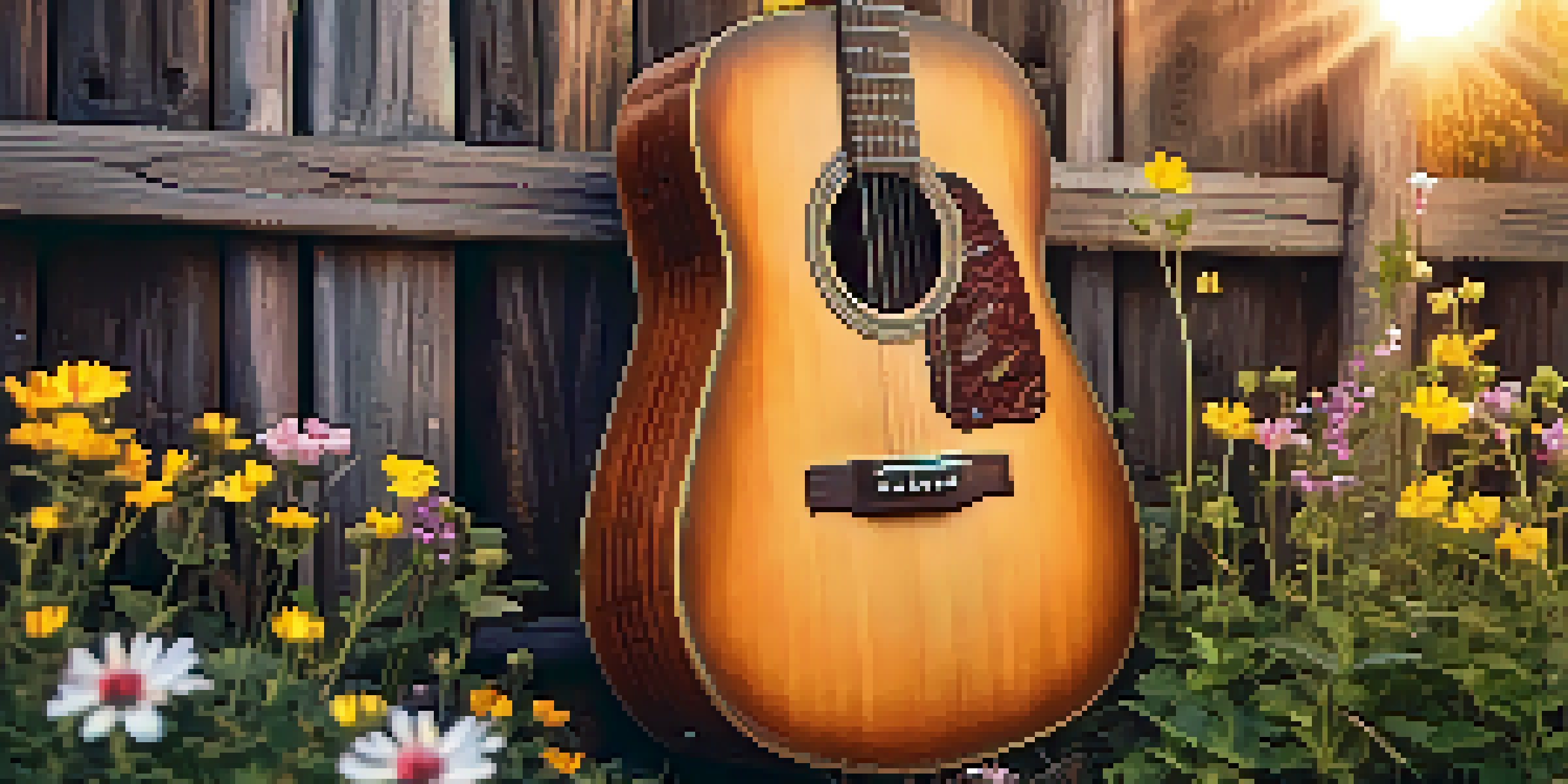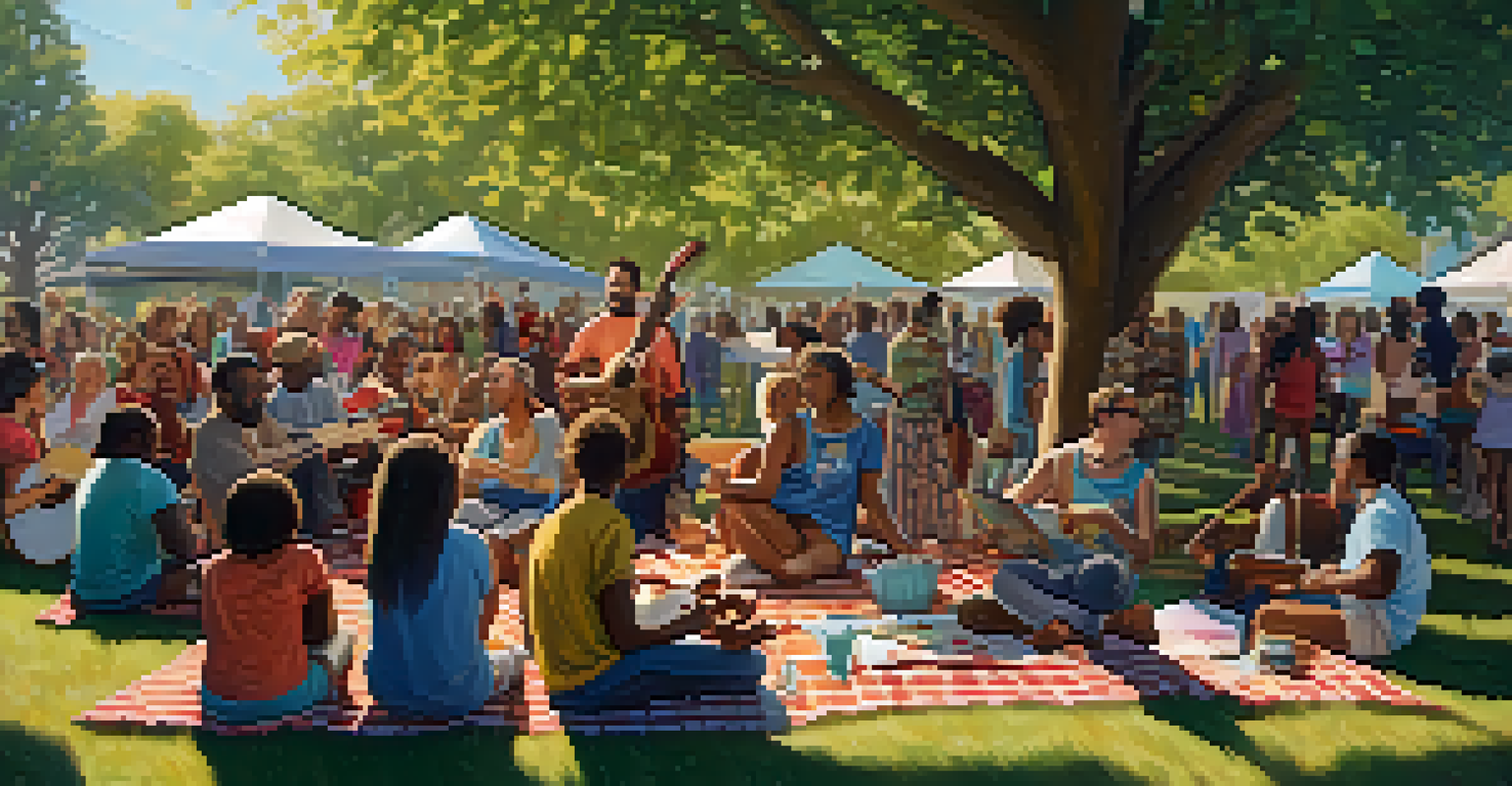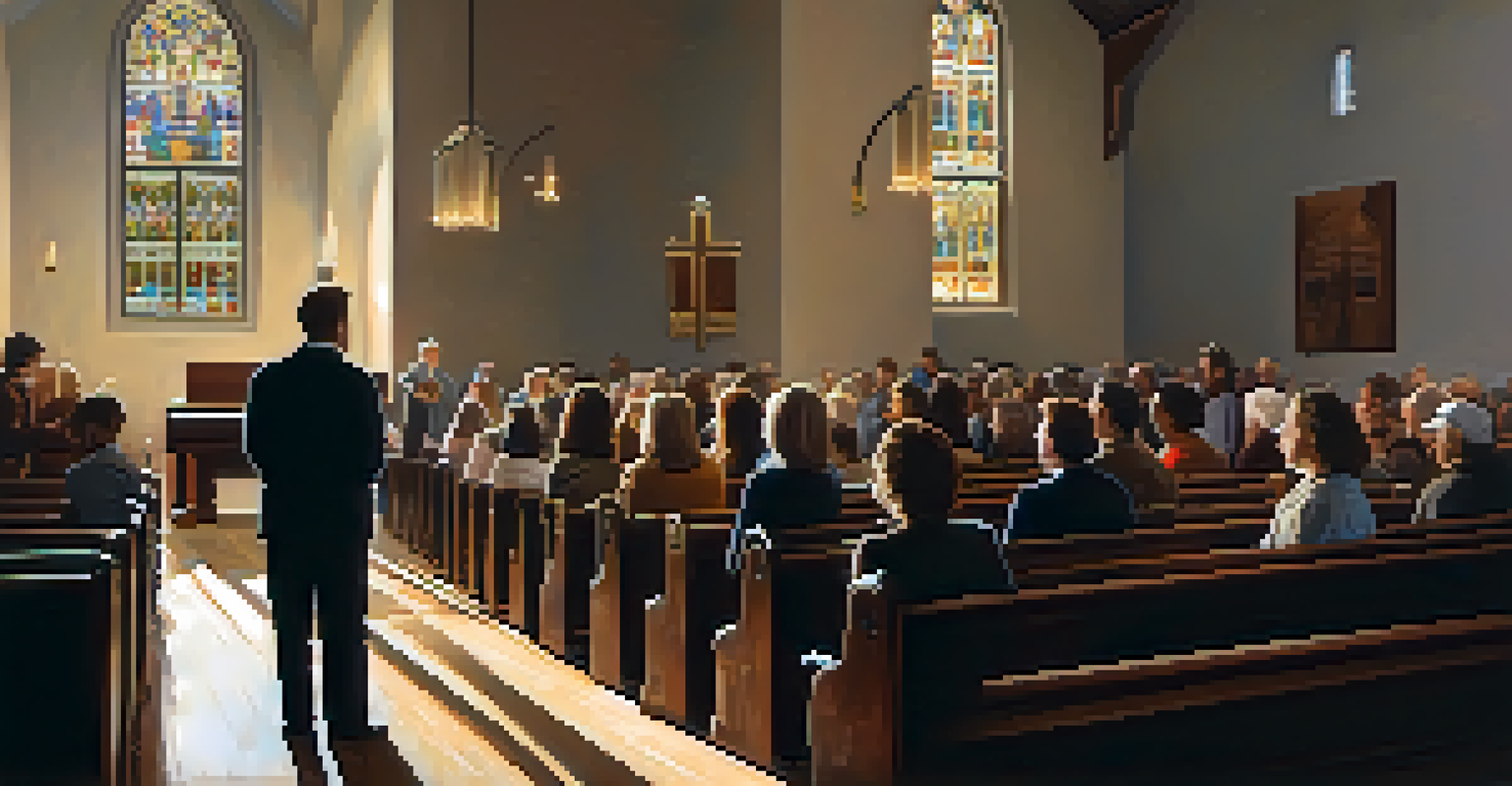The Power of Guitar in the Civil Rights Movement

The Guitar: A Symbol of Hope and Resistance
During the Civil Rights Movement, the guitar emerged as a powerful symbol of hope and resistance. Its soulful melodies resonated with the struggle for equality, embodying the spirit of the fight against racial injustice. From the streets to the stages, the guitar was more than just an instrument; it became a voice for those yearning for change.
The power of music is a gift that transcends the barriers of race, religion, and culture.
Musicians like Pete Seeger and Joan Baez wielded their guitars to inspire and mobilize crowds, turning folk songs into anthems for social justice. Songs like 'We Shall Overcome' echoed through rallies and marches, uniting people in their shared quest for civil rights. The simple yet profound strumming of a guitar could uplift spirits and galvanize movements.
The guitar's accessibility allowed everyday people to participate in the movement. Whether in a church, a community center, or on the picket lines, anyone could pick up a guitar and contribute to the cause. This inclusivity made the guitar an essential tool for spreading the message of equality far and wide.
Folk Music as a Catalyst for Change
Folk music played a crucial role in the Civil Rights Movement, with the guitar at its center. This genre, rooted in storytelling, provided a platform for expressing the struggles and aspirations of African Americans. Through poignant lyrics and memorable melodies, folk songs became a vehicle for social change and awareness.

Artists like Bob Dylan and Odetta used their guitars to highlight the injustices faced by marginalized communities. Songs such as 'Blowin' in the Wind' posed rhetorical questions that challenged listeners to confront the harsh realities of racism and inequality. The guitar's sound carried these messages far beyond the concert halls, reaching the hearts of those who needed to hear them most.
Guitar as a Symbol of Resistance
During the Civil Rights Movement, the guitar became a powerful symbol of hope and resistance, uniting people in their fight for equality.
Moreover, folk music's grassroots nature allowed it to transcend social barriers. Musicians often collaborated with activists, creating a powerful synergy that amplified the movement's message. The guitar strummed in living rooms and public squares became a rallying cry for justice, echoing the urgency of the times.
The Spiritual Connection of Guitar Music
Guitar music also found its place in the religious aspects of the Civil Rights Movement. Spirituals and gospel music, often accompanied by the guitar, drew on deep-rooted traditions of African American worship. These songs provided solace and strength to those enduring hardships, serving as a reminder of faith and resilience.
One day, the world will know that the music of the people is the music of freedom.
Musical gatherings in churches became sanctuaries for activists, where the guitar strummed the chords of unity and hope. Songs like 'This Little Light of Mine' inspired courage and determination, reinforcing the belief that change was possible. The guitar's soothing melodies offered comfort amidst chaos, creating a sense of community among those fighting for justice.
This spiritual connection was not just about music; it was about creating a safe space for dialogue and support. The guitar became a bridge that connected people from diverse backgrounds, fostering a collective consciousness focused on liberation. Together, they sang, prayed, and planned for a better future.
Iconic Songs That Shaped the Movement
Several iconic songs emerged as anthems of the Civil Rights Movement, with the guitar leading the way. 'We Shall Overcome,' originally a gospel hymn, transformed into a universal call for justice. Its simple yet powerful message resonated deeply, becoming a staple at protests and marches across the country.
Another notable example is 'A Change Is Gonna Come' by Sam Cooke, which captured the essence of hope amidst struggle. The haunting guitar riff paired with poignant lyrics spoke to the heart of the civil rights struggle, providing an emotional soundtrack for those yearning for change. Cooke's song became a timeless reminder of the fight for equality.
Folk Music Fuels Social Change
Folk music, with the guitar at its heart, served as a crucial platform for expressing the struggles of marginalized communities and promoting social awareness.
These songs, often sung in unison during marches, created a sense of solidarity among participants. The shared experience of singing together, led by the strumming of guitars, fostered a powerful bond that transcended race and geography. Music, especially guitar-driven songs, became a unifying force in the pursuit of civil rights.
The Role of Guitarists in Activism
Guitarists played a vital role in the activism of the Civil Rights Movement, using their talent to draw attention to social issues. Many musicians not only performed but also actively participated in protests, rallies, and community organizing. Their presence on the front lines amplified the movement's message, showcasing how music and activism could go hand in hand.
Artists like Nina Simone and Richie Havens used their platforms to speak out against injustice, often incorporating their experiences into their music. Simone's powerful rendition of 'Mississippi Goddam' was a direct response to racial violence, while Havens' performance at Woodstock highlighted the interconnectedness of various social movements. Their guitars became instruments of change, echoing the sentiments of a generation.
By blending music with activism, these guitarists inspired others to take action. Their performances often served as a rallying point, motivating audiences to engage in the struggle for civil rights. The guitar, in their hands, was not just an instrument; it was a tool for empowerment and transformation.
The Lasting Legacy of Guitar Music in Civil Rights
The legacy of guitar music in the Civil Rights Movement continues to resonate today. Songs from that era still inspire new generations to advocate for justice and equality. The guitar, as a symbol of resilience, remains a powerful reminder of the ongoing struggle against oppression and discrimination.
Modern artists, influenced by the music of the Civil Rights Movement, often draw from its themes and styles. Contemporary musicians like Common and Beyoncé incorporate elements of this rich musical history, using their platforms to address social issues. The guitar's role in these new compositions reinforces the idea that music can be a catalyst for change.
Legacy of Guitar Music Endures
The legacy of guitar music from the Civil Rights Movement continues to inspire modern artists and advocates for justice and equality today.
As we reflect on the past, it’s essential to recognize how guitar music helped shape the narrative of civil rights. Its ability to connect people and convey powerful messages is a testament to the enduring power of music in advocating for justice. The guitar will always hold a special place in the story of the Civil Rights Movement and the ongoing fight for equality.
Celebrating Guitar Music's Impact on Society
Celebrating the impact of guitar music on society means acknowledging its role in shaping cultural and political landscapes. The songs that emerged during the Civil Rights Movement serve as powerful reminders of the struggles faced and the victories achieved. They invite us to reflect on our own values and the importance of standing up for justice.
Annual events like the Newport Folk Festival and civil rights commemorations often feature these iconic songs, ensuring their relevance in contemporary discussions about social justice. By playing the music of the past, we honor those who fought for equality and inspire future generations to continue the work. The guitar remains a timeless instrument for change.

Moreover, educational programs that teach the history of music in social movements help to instill a sense of responsibility in young musicians. By understanding the context and significance of their art, they can carry forward the legacy of activism through their own music. In this sense, guitar music is not just a part of history; it is a living, breathing force that continues to inspire action.